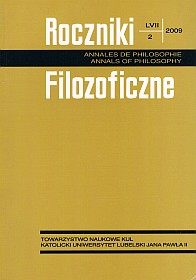Klasyczna definicja prawdy w epistemologicznych poglądach Désiré Merciera
Abstrakt
The main aim of this article is to present an outline of the most important part of a theoretical-cognitive conception by Désiré Mercier, a founder of a Neo-scholastic Louvain school, showing not only the issue crucial to his philosophy, but also an evolution of an epistemological thought by a Belgian cardinal.
In this main part, the article examines an evolution of Mercier’s means of interpretation of a classical definition of truth, and shows a prospect for the analysis of his understanding of a judgement’s nature, especially the nature of the references between its two basics constituents: a subject and predicate. In Mercier’s opinion, it is the most important problem in all theory of certainty, and he defines it like a first fundamental problem – a synthesis of the subject and predicate, i.e. the question on the status and cognitive value of different kinds of opinion. His effort in solution of this problem concerns mainly A general criteriology, Mercier’s main work in which a systematic theory of cognition is derived from Thomas Aquinas’s classical texts, confirming a Thomistic epistemology on the paths of a philosophical realism.
Bibliografia
Bańka A. R.: Désiré Merciera ogólna teoria pewności, Katowice 2008.
Boileau D. A.: Cardinal Mercier: A Memoir, introduction by R. Aubert, preface by G. Danneels, Leuven 1997.
Folghera J. D.: Jugement et vérité, „Revue thomiste” 7 (1899), septembre–octobre, s. 427-446.
Folghera J. D.: La notion de la vérité, „Revue thomiste” 7 (1899), novembre–décembre, s. 695-713.
Mélanges et documents. Le mouvement néo-thomiste, „Revue néo-scholastique” 1903, nr 10, s. 203-218.
Mercier D., Nys D.: Traité élémentaire de la philosophie à l’usage des classes, édité par des Professeurs de l’Institut Supérieur de Philosophie de l’Université de Louvain, t. 1, Louvain 1922.
Mercier D.: Théorie de la connaissance certaine, Louvain 1885.
Mercier D.: Du fondement de la certitude, Louvain 1889.
Mercier D.: La théorie des trois vérités primitives, Louvain 1895.
Mercier D.: Critériologie générale ou Théorie générale de la certitude, Louvain–Paris 1899.
Mercier D.: Critériologie générale ou Théorie générale de la certitude, Louvain–Paris 1911.
Mercier D.: La notion de la vérité, „Revue néo-scholastique” 1899, nr 6, s. 371-403.
Mercier D.: Logique, Louvain 1905.
Mercier D.: Métaphysique générale ou Ontologie, Louvain–Paris 1910.
Michalski K.: Centra ruchu neoscholastycznego, „Przegląd Współczesny” 1924, t. 9, s. 231-255.
Noël L.: Notes d’épistémologie thomiste, Louvain–Paris 1925.
Van Riet G.: L’Épistémologie thomiste, Louvain 1946.
Copyright (c) 2009 Roczniki Filozoficzne

Utwór dostępny jest na licencji Creative Commons Uznanie autorstwa – Użycie niekomercyjne – Bez utworów zależnych 4.0 Międzynarodowe.





